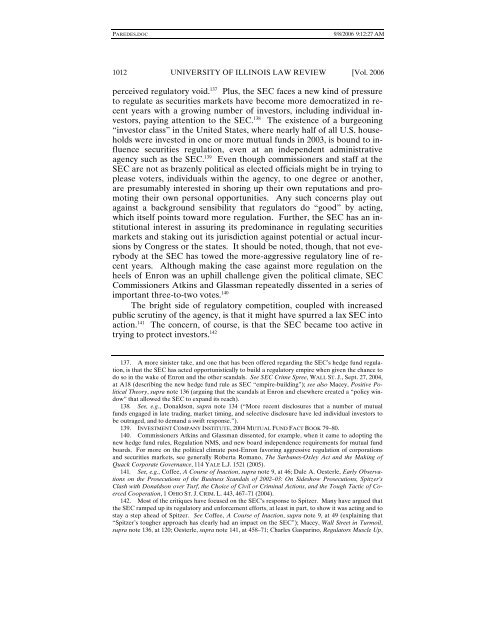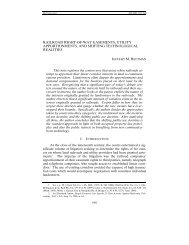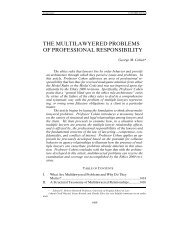on the decision to regulate hedge funds - University of Illinois Law ...
on the decision to regulate hedge funds - University of Illinois Law ...
on the decision to regulate hedge funds - University of Illinois Law ...
You also want an ePaper? Increase the reach of your titles
YUMPU automatically turns print PDFs into web optimized ePapers that Google loves.
PAREDES.DOC<br />
9/8/2006 9:12:27 AM<br />
1012 UNIVERSITY OF ILLINOIS LAW REVIEW [Vol. 2006<br />
perceived regula<strong>to</strong>ry void. 137 Plus, <strong>the</strong> SEC faces a new kind <strong>of</strong> pressure<br />
<strong>to</strong> <strong>regulate</strong> as securities markets have become more democratized in recent<br />
years with a growing number <strong>of</strong> inves<strong>to</strong>rs, including individual inves<strong>to</strong>rs,<br />
paying attenti<strong>on</strong> <strong>to</strong> <strong>the</strong> SEC. 138 The existence <strong>of</strong> a burge<strong>on</strong>ing<br />
“inves<strong>to</strong>r class” in <strong>the</strong> United States, where nearly half <strong>of</strong> all U.S. households<br />
were invested in <strong>on</strong>e or more mutual <strong>funds</strong> in 2003, is bound <strong>to</strong> influence<br />
securities regulati<strong>on</strong>, even at an independent administrative<br />
agency such as <strong>the</strong> SEC. 139 Even though commissi<strong>on</strong>ers and staff at <strong>the</strong><br />
SEC are not as brazenly political as elected <strong>of</strong>ficials might be in trying <strong>to</strong><br />
please voters, individuals within <strong>the</strong> agency, <strong>to</strong> <strong>on</strong>e degree or ano<strong>the</strong>r,<br />
are presumably interested in shoring up <strong>the</strong>ir own reputati<strong>on</strong>s and promoting<br />
<strong>the</strong>ir own pers<strong>on</strong>al opportunities. Any such c<strong>on</strong>cerns play out<br />
against a background sensibility that regula<strong>to</strong>rs do “good” by acting,<br />
which itself points <strong>to</strong>ward more regulati<strong>on</strong>. Fur<strong>the</strong>r, <strong>the</strong> SEC has an instituti<strong>on</strong>al<br />
interest in assuring its predominance in regulating securities<br />
markets and staking out its jurisdicti<strong>on</strong> against potential or actual incursi<strong>on</strong>s<br />
by C<strong>on</strong>gress or <strong>the</strong> states. It should be noted, though, that not everybody<br />
at <strong>the</strong> SEC has <strong>to</strong>wed <strong>the</strong> more-aggressive regula<strong>to</strong>ry line <strong>of</strong> recent<br />
years. Although making <strong>the</strong> case against more regulati<strong>on</strong> <strong>on</strong> <strong>the</strong><br />
heels <strong>of</strong> Enr<strong>on</strong> was an uphill challenge given <strong>the</strong> political climate, SEC<br />
Commissi<strong>on</strong>ers Atkins and Glassman repeatedly dissented in a series <strong>of</strong><br />
important three-<strong>to</strong>-two votes. 140<br />
The bright side <strong>of</strong> regula<strong>to</strong>ry competiti<strong>on</strong>, coupled with increased<br />
public scrutiny <strong>of</strong> <strong>the</strong> agency, is that it might have spurred a lax SEC in<strong>to</strong><br />
acti<strong>on</strong>. 141 The c<strong>on</strong>cern, <strong>of</strong> course, is that <strong>the</strong> SEC became <strong>to</strong>o active in<br />
trying <strong>to</strong> protect inves<strong>to</strong>rs. 142<br />
137. A more sinister take, and <strong>on</strong>e that has been <strong>of</strong>fered regarding <strong>the</strong> SEC’s <strong>hedge</strong> fund regulati<strong>on</strong>,<br />
is that <strong>the</strong> SEC has acted opportunistically <strong>to</strong> build a regula<strong>to</strong>ry empire when given <strong>the</strong> chance <strong>to</strong><br />
do so in <strong>the</strong> wake <strong>of</strong> Enr<strong>on</strong> and <strong>the</strong> o<strong>the</strong>r scandals. See SEC Crime Spree, WALL ST. J., Sept. 27, 2004,<br />
at A18 (describing <strong>the</strong> new <strong>hedge</strong> fund rule as SEC “empire-building”); see also Macey, Positive Political<br />
Theory, supra note 136 (arguing that <strong>the</strong> scandals at Enr<strong>on</strong> and elsewhere created a “policy window”<br />
that allowed <strong>the</strong> SEC <strong>to</strong> expand its reach).<br />
138. See, e.g., D<strong>on</strong>alds<strong>on</strong>, supra note 134 (“More recent disclosures that a number <strong>of</strong> mutual<br />
<strong>funds</strong> engaged in late trading, market timing, and selective disclosure have led individual inves<strong>to</strong>rs <strong>to</strong><br />
be outraged, and <strong>to</strong> demand a swift resp<strong>on</strong>se.”).<br />
139. INVESTMENT COMPANY INSTITUTE, 2004 MUTUAL FUND FACT BOOK 79–80.<br />
140. Commissi<strong>on</strong>ers Atkins and Glassman dissented, for example, when it came <strong>to</strong> adopting <strong>the</strong><br />
new <strong>hedge</strong> fund rules, Regulati<strong>on</strong> NMS, and new board independence requirements for mutual fund<br />
boards. For more <strong>on</strong> <strong>the</strong> political climate post-Enr<strong>on</strong> favoring aggressive regulati<strong>on</strong> <strong>of</strong> corporati<strong>on</strong>s<br />
and securities markets, see generally Roberta Romano, The Sarbanes-Oxley Act and <strong>the</strong> Making <strong>of</strong><br />
Quack Corporate Governance, 114 YALE L.J. 1521 (2005).<br />
141. See, e.g., C<strong>of</strong>fee, A Course <strong>of</strong> Inacti<strong>on</strong>, supra note 9, at 46; Dale A. Oesterle, Early Observati<strong>on</strong>s<br />
<strong>on</strong> <strong>the</strong> Prosecuti<strong>on</strong>s <strong>of</strong> <strong>the</strong> Business Scandals <strong>of</strong> 2002–03: On Sideshow Prosecuti<strong>on</strong>s, Spitzer’s<br />
Clash with D<strong>on</strong>alds<strong>on</strong> over Turf, <strong>the</strong> Choice <strong>of</strong> Civil or Criminal Acti<strong>on</strong>s, and <strong>the</strong> Tough Tactic <strong>of</strong> Coerced<br />
Cooperati<strong>on</strong>, 1 OHIO ST. J. CRIM. L. 443, 467–71 (2004).<br />
142. Most <strong>of</strong> <strong>the</strong> critiques have focused <strong>on</strong> <strong>the</strong> SEC’s resp<strong>on</strong>se <strong>to</strong> Spitzer. Many have argued that<br />
<strong>the</strong> SEC ramped up its regula<strong>to</strong>ry and enforcement efforts, at least in part, <strong>to</strong> show it was acting and <strong>to</strong><br />
stay a step ahead <strong>of</strong> Spitzer. See C<strong>of</strong>fee, A Course <strong>of</strong> Inacti<strong>on</strong>, supra note 9, at 49 (explaining that<br />
“Spitzer’s <strong>to</strong>ugher approach has clearly had an impact <strong>on</strong> <strong>the</strong> SEC”); Macey, Wall Street in Turmoil,<br />
supra note 136, at 120; Oesterle, supra note 141, at 458–71; Charles Gasparino, Regula<strong>to</strong>rs Muscle Up,




